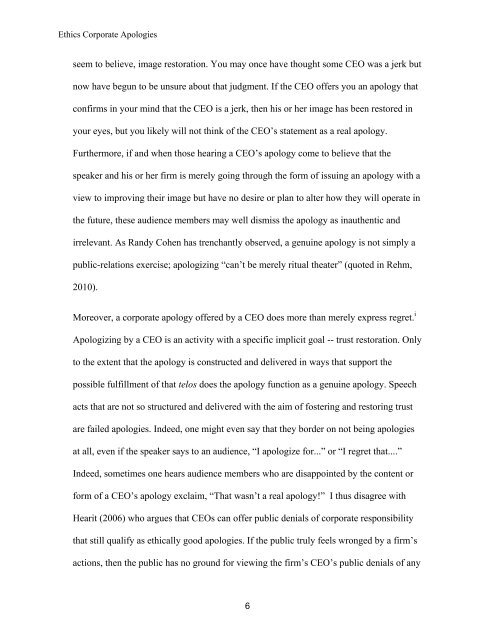Why Saying “I'm Sorry” Isn't Good Enough: The Ethics of Corporate ...
Why Saying “I'm Sorry” Isn't Good Enough: The Ethics of Corporate ...
Why Saying “I'm Sorry” Isn't Good Enough: The Ethics of Corporate ...
Create successful ePaper yourself
Turn your PDF publications into a flip-book with our unique Google optimized e-Paper software.
<strong>Ethics</strong> <strong>Corporate</strong> Apologies<br />
seem to believe, image restoration. You may once have thought some CEO was a jerk but<br />
now have begun to be unsure about that judgment. If the CEO <strong>of</strong>fers you an apology that<br />
confirms in your mind that the CEO is a jerk, then his or her image has been restored in<br />
your eyes, but you likely will not think <strong>of</strong> the CEO’s statement as a real apology.<br />
Furthermore, if and when those hearing a CEO’s apology come to believe that the<br />
speaker and his or her firm is merely going through the form <strong>of</strong> issuing an apology with a<br />
view to improving their image but have no desire or plan to alter how they will operate in<br />
the future, these audience members may well dismiss the apology as inauthentic and<br />
irrelevant. As Randy Cohen has trenchantly observed, a genuine apology is not simply a<br />
public-relations exercise; apologizing “can’t be merely ritual theater” (quoted in Rehm,<br />
2010).<br />
Moreover, a corporate apology <strong>of</strong>fered by a CEO does more than merely express regret. i<br />
Apologizing by a CEO is an activity with a specific implicit goal -- trust restoration. Only<br />
to the extent that the apology is constructed and delivered in ways that support the<br />
possible fulfillment <strong>of</strong> that telos does the apology function as a genuine apology. Speech<br />
acts that are not so structured and delivered with the aim <strong>of</strong> fostering and restoring trust<br />
are failed apologies. Indeed, one might even say that they border on not being apologies<br />
at all, even if the speaker says to an audience, “I apologize for...” or “I regret that....”<br />
Indeed, sometimes one hears audience members who are disappointed by the content or<br />
form <strong>of</strong> a CEO’s apology exclaim, “That wasn’t a real apology!” I thus disagree with<br />
Hearit (2006) who argues that CEOs can <strong>of</strong>fer public denials <strong>of</strong> corporate responsibility<br />
that still qualify as ethically good apologies. If the public truly feels wronged by a firm’s<br />
actions, then the public has no ground for viewing the firm’s CEO’s public denials <strong>of</strong> any<br />
6

















